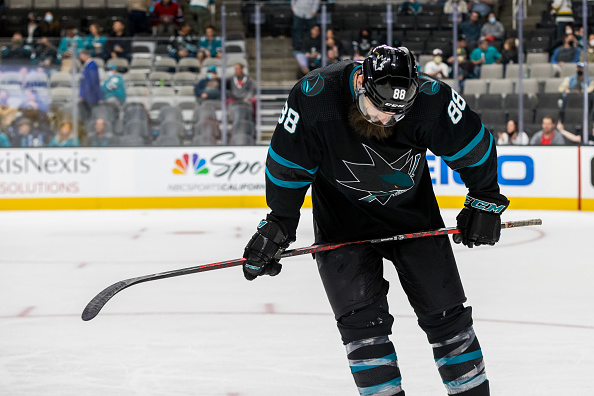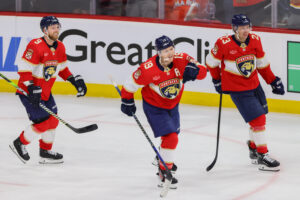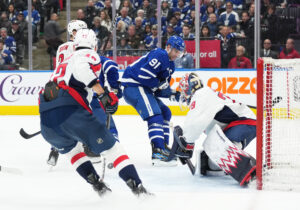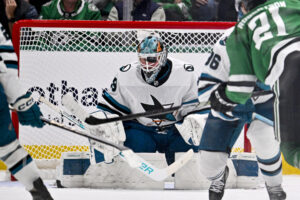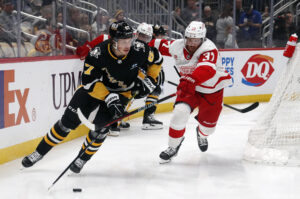A bad NHL team should have one objective: become a very good NHL team. In some cases, the path is short, in other cases, the path is long. The 2021-22 San Jose Sharks are not a good team. And their path to becoming a good team, well, it will take a while.
The problem with the Sharks is they really aren’t on a path. Yes, it will take a while to become good again, but there is no point in delaying the start of the process. General manager Doug Wilson (wishing him well in his medical leave of absence) called this season a “reset”, not a rebuild.
The problem is, this team doesn’t need a reset, whatever that is. It needs a rebuild.
2021-22 San Jose Sharks Wasting a Season
Obstacles
What are the obstacles on the way to the Sharks becoming a better team?
There are two major ones. The first is the team’s salary cap situation. The Sharks have four contracts for players, who collectively, aren’t worth the money they are being paid. These contracts take up over 40% of the team’s cap space. The players’ ages range from 31 to 36. While not every player is in decline, some are and more will be. These contracts do not end anytime soon, they have another 3-5 seasons after this one. This is before counting whatever happens with recently waived Evander Kane, whose grievance might cost the Sharks another large chunk of money and eat more cap space.
The second issue is the limited amount of younger talent inside the organization. The team has traded away several capable younger players while drafts haven’t provided sufficient talent. In part, because the team has rarely drafted near the top and because they traded away some of their higher draft spots to acquire expensive talent including Kane and Erik Karlsson.
Not All Hope Is Lost
The organization is in a hole and it will take a while to dig out. It happens and one should note, is natural in the course of most sports franchises. In the 2020 offseason, the Sharks failed to recognize the hole they were in, so they didn’t make a serious attempt to dig out of it. One can rationalize that decision for the 2020 offseason. What can’t be rationalized is the failure to aggressively begin digging out in the 2021 offseason.
And lest one think there is no way the Sharks could dig out, here’s a gentle reminder that the Minnesota Wild bought out two players in the recent offseason, costing them $50 million in cap space. For nothing in return.
Every year, good teams with high hopes try to rid themselves of problematic contracts. There are likely trade partners for the Sharks. For example, the Wild were what ‘might have been’ in the summer of 2021. Every season, there are teams willing to take on a ‘later’ problem to address a ‘now’ problem. For a team involved in a reset, apparently, short-term thinking dominates. Could the Sharks have offloaded a problematic contract in a deal with the Wild? Was there even a discussion? A team looking to reset doesn’t make the phone call, a team looking to rebuild does.
2021-22 San Jose Sharks Swimming in the Wrong Direction
The offseason’s most meaningful moves might make the hole deeper. They bought out problematic goalie Martin Jones, which means he’ll continue to be a cap space problem for the team for five more seasons after this season instead of just two. They’ll save cap space during seasons the team isn’t going to be competitive, but take an added cap hit when they’d have a chance to be competitive. Yuck.
The team acquired Jones’s replacement, Adin Hill, a third string goalie for his former team. The Sharks paid a second-round draft pick to acquire him. This is a trade a team doesn’t make in a rebuild.
The Sharks goalie plan is off to a dubious start, as Jones has a better record and better save percentage than Hill (Hill did get the overtime win over Jones in their head-to-head match-up, despite Jones 44 saves and just two goals allowed in regulation).
The Sharks’ backup net minder, veteran James Reimer, has taken over as the team’s starter and kept this team in fringe contention for a playoff spot.
The San Jose Sharks Culture Reset
The Sharks can point to this season as a ‘culture reset’. Perhaps, but that is aiming low. Very low.
There’s been discussion about the risks of a team tanking in order to acquire high draft picks. The ‘against’ side says tanking is not consistent with a healthy culture and therefore must be avoided. Does this argument stand up to scrutiny? Not really, because it represents a false choice. Playing young players in roles that stretch their abilities will have mixed results and a team’s record is likely to reflect that. But this is not tanking, it is developing.
A losing team does not equate to a broken culture. The Sharks long-time rival, the Los Angeles Kings, finished last in the division in 2008 and again in 2009. With the same key players, they hoisted the Stanley Cup in 2012 (and again in 2014). A similar pattern occurred with the Chicago Blackhawks, they finished last in their division in 2007, they hoisted a Cup of their own in 2010 (and 2013 and 2015).
One can reset a culture relatively easily, relatively inexpensively. The Sharks addition of Reimer, Andrew Cogliano and Nick Bonino is a good way to do this. Three very successful veterans loaded with good habits and leadership traits. Parting with those who don’t help the desired culture is also part of the process.
Having a positive culture does matter. But improving the culture is not now, nor has it ever been, a significant obstacle for the Sharks.
Commitment Matters
Other Western Conference teams have embraced a rebuild, including the Kings, Anaheim Ducks and most aggressively, the Arizona Coyotes. Each team has a youth movement that dwarfs that of the Sharks. Below is a table of premium draft picks (rounds 1 and 2), recent and upcoming in 2022 (pending any transactions), for each team.
Premium Draft Picks Comparison (Rounds 1 & 2)
The results are telling. Over five draft classes the Kings, Coyotes and Ducks are looking at between 12 and 15 premium draft picks, the Sharks have just eight. Each of these other teams has more top five selections, more top ten selections, more first round selections and more combined first and second round selections than the Sharks.
These other teams have substantially better odds at getting the sort of core talent that can carry a franchise for an extended period. Their draft edge is both quantitative and qualitative. These teams made decisions to rebuild, not reset. They committed to a better future. The Sharks haven’t matched that commitment.
The Hypothetical Test Case
One can boil down the 2021-22 San Jose Sharks situation by putting it to a hypothetical test.
What does the team do if it is in the hunt for a playoff spot when the trade deadline approaches? Does it sell off players (value now) for draft picks (value later) and lose a playoff spot as a result? Does it stand pat, keep the roster as is, and hope the existing team can make it into the playoffs? Or does it add talent in the hope of getting a playoff spot, while trading away draft picks to acquire that talent?
This is hypothetical, for now. The Sharks have spent most of the season projecting to finish with about 90 points. Typically, 90 points is a few points short of a playoff spot. Should they project to about 90 points come the trade deadline, they will most definitely be in the playoff hunt (especially in the weak Pacific Division) and the hypothetical becomes reality.
The questions posed should not be difficult to answer. This team isn’t built to win big this season, next season or the season after. The lone logical answer is to aggressively build towards sustainable success circa 2025, but the reset approach doesn’t much care about 2025. It cares about now. The Sharks have been much too interested in ‘now’ and this mindset will delay their ability to become competitive.
The Sharks: Now and Later
In simple terms, the Sharks are making decisions about the value of ‘now’ versus the value of ‘later’. The team should be, overwhelmingly, making decisions based on later. That is not what they are doing.
The old saying goes like this: fool me once, shame on you, fool me twice, shame on me. The Sharks are upgrading from bad to mediocre, but in the process, turning mediocre into an extended norm.
The Sharks are now in their third consecutive season of mediocre (or worse) hockey. They’ve been fooled twice into believing they were substantially better than they actually were. The old saying doesn’t offer up a position for those who get fooled a third time.
It is beyond disappointing the organization hasn’t figured out a path to someplace. The 2021-22 San Jose Sharks are on a reset to nowhere.
Main Photo:


